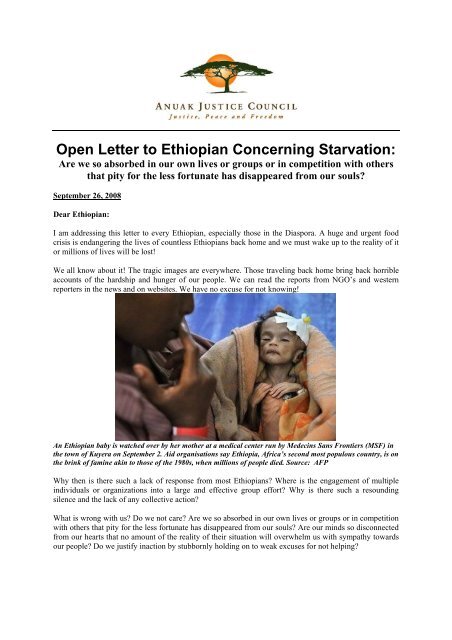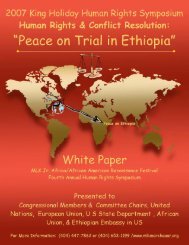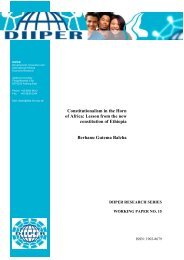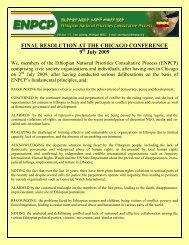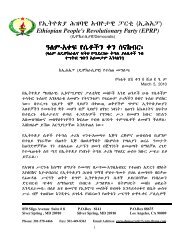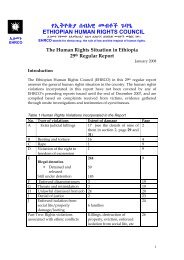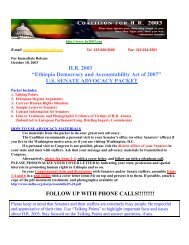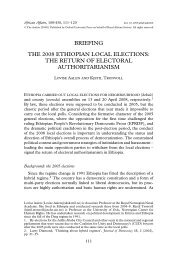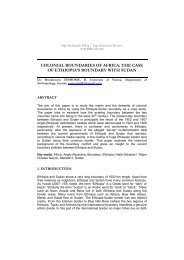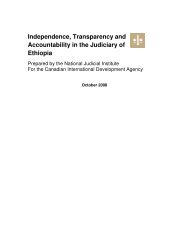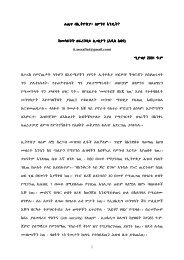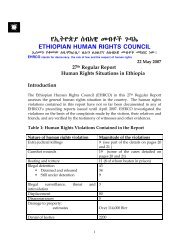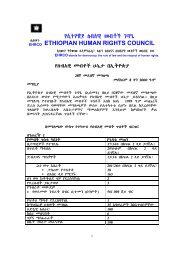Open Letter to Ethiopian Concerning Starvation: - Abbay Media ...
Open Letter to Ethiopian Concerning Starvation: - Abbay Media ...
Open Letter to Ethiopian Concerning Starvation: - Abbay Media ...
You also want an ePaper? Increase the reach of your titles
YUMPU automatically turns print PDFs into web optimized ePapers that Google loves.
<strong>Open</strong> <strong>Letter</strong> <strong>to</strong> <strong>Ethiopian</strong> <strong>Concerning</strong> <strong>Starvation</strong>:<br />
Are we so absorbed in our own lives or groups or in competition with others<br />
that pity for the less fortunate has disappeared from our souls?<br />
September 26, 2008<br />
Dear <strong>Ethiopian</strong>:<br />
I am addressing this letter <strong>to</strong> every <strong>Ethiopian</strong>, especially those in the Diaspora. A huge and urgent food<br />
crisis is endangering the lives of countless <strong>Ethiopian</strong>s back home and we must wake up <strong>to</strong> the reality of it<br />
or millions of lives will be lost!<br />
We all know about it! The tragic images are everywhere. Those traveling back home bring back horrible<br />
accounts of the hardship and hunger of our people. We can read the reports from NGO’s and western<br />
reporters in the news and on websites. We have no excuse for not knowing!<br />
An <strong>Ethiopian</strong> baby is watched over by her mother at a medical center run by Medecins Sans Frontiers (MSF) in<br />
the <strong>to</strong>wn of Kuyera on September 2. Aid organisations say Ethiopia, Africa’s second most populous country, is on<br />
the brink of famine akin <strong>to</strong> those of the 1980s, when millions of people died. Source: AFP<br />
Why then is there such a lack of response from most <strong>Ethiopian</strong>s? Where is the engagement of multiple<br />
individuals or organizations in<strong>to</strong> a large and effective group effort? Why is there such a resounding<br />
silence and the lack of any collective action?<br />
What is wrong with us? Do we not care? Are we so absorbed in our own lives or groups or in competition<br />
with others that pity for the less fortunate has disappeared from our souls? Are our minds so disconnected<br />
from our hearts that no amount of the reality of their situation will overwhelm us with sympathy <strong>to</strong>wards<br />
our people? Do we justify inaction by stubbornly holding on <strong>to</strong> weak excuses for not helping?
It is close <strong>to</strong> one year since we first heard that 11 million people needed food and since that time, the<br />
seriousness of the situation has worsened even though the numbers of those in jeopardy keep changing.<br />
Now we hear that the starvation could be worse than what happened in 1984, but there is no response<br />
from those in charge of our government. The American economy is in crisis and you can see how hard the<br />
government and institutions are working in order <strong>to</strong> find solutions, but there appears <strong>to</strong> be nothing similar<br />
going on in Ethiopia during one of our worst ever crises.<br />
The United Nations is appealing for $460 million dollars <strong>to</strong> help feed starving <strong>Ethiopian</strong>s. The U.S. and<br />
the U.K. are also making plans <strong>to</strong> contribute along with other international organizations who are<br />
pleading for funds <strong>to</strong> meet the needs of starving <strong>Ethiopian</strong>s, but it bothers me that we are not hearing the<br />
same urgent pleas from <strong>Ethiopian</strong>s outside the country. This is what is motivating me <strong>to</strong> write this letter.<br />
Why are non-<strong>Ethiopian</strong>s working harder than we are? Why should they care about our people if we do not<br />
care enough <strong>to</strong> share? Why do we expect others <strong>to</strong> do the work for us like we are incapable of doing<br />
anything ourselves? Are we only victims who constantly have <strong>to</strong> be taken care of by “leaders” or “outside<br />
beneficiaries” as if we were a culture of children?<br />
How can we live in such a delusion of being “proud <strong>Ethiopian</strong>s” from an “ancient culture,” “never<br />
colonized” by outsiders”, when we expect everyone else <strong>to</strong> do the work for us? This is <strong>to</strong> our shame! It is<br />
like we are refusing <strong>to</strong> “grow up” and assume responsibility for helping our own people back home, even<br />
if it is a dollar at a time!<br />
First of all, I am coming <strong>to</strong> you only as a person who can no longer stand it! This is no longer about the<br />
Solidarity Movement for a New Ethiopia—no matter how much I believe in its principles. It is not about<br />
the Anuak Justice Council or any other organization because I am fearful that <strong>Ethiopian</strong>s might simply<br />
use such a label as an excuse not <strong>to</strong> join in and help. For the same reason, it is not about Kinijit, Ginbot 7,<br />
Andenet, EPRP, the OLF, the ONLF, the EPRDF or the many diverse other political, ethnic, religious and<br />
civic organizations! This is about all of us <strong>Ethiopian</strong>s!<br />
I am not saying that joining <strong>to</strong>gether in solidarity would not be better because the basic objective of the<br />
Solidarity Movement for a New Ethiopia is about saving lives and saving our country from disintegration.<br />
This is a time <strong>to</strong> put our differences aside and join <strong>to</strong> create a stronger, more effective and more<br />
compassionate society!<br />
The mission statement of the Solidarity Movement for a New Ethiopia is: To establish a viable<br />
alliance—a united front composed of all dissatisfied groups, irrespective of their ethnic<br />
backgrounds, religious affiliations and political tilts, with the common goal of installing genuine<br />
democracy and social justice in the spirit of a united Ethiopia.<br />
I also am convinced that <strong>Ethiopian</strong> solidarity is the only way <strong>to</strong> succeed in surviving as a nation; however,<br />
at this point, there is <strong>to</strong>o much resistance <strong>to</strong> unifying even though it is about coming <strong>to</strong>gether under the<br />
principles of putting humanity above ethnicity and fighting for the freedom of each other since no one<br />
will be free unless we all are free.<br />
If we could have already established an effective institution <strong>to</strong> spearhead this effort—one that was largely<br />
supported by all <strong>Ethiopian</strong>s—this would have been the time <strong>to</strong> organize a mass effort. However, because<br />
that is not the case, we must each now do our best <strong>to</strong> help, in whatever way we can, instead of failing <strong>to</strong><br />
do anything because we are opposed—or wary of giving support—<strong>to</strong> any outside our own organizations.<br />
- 2 –
A week ago we saw a video of the Tigrayan people, praying <strong>to</strong> God for food and rain. Just recently we<br />
saw the video of the Ogadenis who are starving. We heard about children unable <strong>to</strong> attend school because<br />
of hunger and families having <strong>to</strong> eat in shifts. In the last month it has been a daily thing with new<br />
examples of suffering and hunger. My appeal <strong>to</strong> <strong>Ethiopian</strong>s is <strong>to</strong> put yourselves in the shoes of those<br />
people back home. Forget the division between the political groups and who has done what—attacking,<br />
blaming and finger-pointing! Enough with all of this! The people of Ethiopia are dying.<br />
There is no way that differences between <strong>Ethiopian</strong> political parties are more important than the<br />
<strong>Ethiopian</strong> child who is dying because of no food.<br />
There is no way that differences between Liberation Fronts or break-away groups and those who<br />
oppose such break-away groups are more important than the mother who just buried three of her<br />
children because of starvation.<br />
There is no way that differences between those who advance an armed struggle and those who<br />
advocate a peaceful struggle are more important than helping the father or mother who can only offer<br />
emotion, tears and despair <strong>to</strong> their children, rather than the food for which the child is crying.<br />
There is no way that differences of ethnicity and language are more meaningful than reaching out <strong>to</strong><br />
help those who are only able <strong>to</strong> eat one meager meal every other day.<br />
Many <strong>Ethiopian</strong>s are religious people, but if Jesus Christ or Muhammad came <strong>to</strong> Ethiopia <strong>to</strong>day, would<br />
we be ashamed of how <strong>Ethiopian</strong>s who have more, have treated other <strong>Ethiopian</strong>s who have nothing?<br />
Right now we have no time <strong>to</strong> argue about what divides us. Every one of us is needed <strong>to</strong> act with<br />
compassion and generosity <strong>to</strong>wards those in need—<strong>to</strong> be Good Samaritans <strong>to</strong> those <strong>Ethiopian</strong>s who are<br />
starving. If we ignore the great crisis facing <strong>Ethiopian</strong>s at home it will be a disgrace <strong>to</strong> us as a people.<br />
Why should we be doing less than those in the west who are now pleading for help more than we are?<br />
Consider the last time we <strong>Ethiopian</strong>s rose up in action, it was following the shooting of election protes<strong>to</strong>rs<br />
in the streets of Addis Ababa and following the imprisonment of Kinijit leaders. That was good, but what<br />
about now? More <strong>Ethiopian</strong>s will lose their lives <strong>to</strong> starvation and related disease <strong>to</strong>day than were shot<br />
following the election of 2005.<br />
I responded <strong>to</strong> the brutal attack on the Anuak people at the time of the massacre of Anuak leaders in 2003,<br />
but it is very possible that more people will die in one day throughout the country from starvation than<br />
were massacred on December 13th. The Meles government is passively ignoring this crisis and people are<br />
dying as a result. Why our complacency now over these deaths?<br />
We can look at most every region in the country and find that more lives may be lost <strong>to</strong> starvation in<br />
Oromia, in the Ogaden, in the Southern Nations, in Tigray and all over Ethiopia in the next weeks and<br />
months than have died in the last 17 years of the EPRDF through direct human rights abuses!<br />
One <strong>Ethiopian</strong> from Bos<strong>to</strong>n recently <strong>to</strong>ld me that the only thing that would get <strong>Ethiopian</strong>s <strong>to</strong> take action<br />
now would be if they saw pictures of people shot and killed in Addis Ababa! What has happened <strong>to</strong> us?<br />
Yet, I know of some wonderful examples of <strong>Ethiopian</strong>s whose hearts of compassion have led <strong>to</strong> practical<br />
acts of generosity and kindness—and there are probably many more of which I have not heard. The<br />
example I am giving you is of <strong>Ethiopian</strong>s who are ordinary people who are making a life and death<br />
difference <strong>to</strong> other <strong>Ethiopian</strong>s.<br />
- 3 –
Let me tell you my friend from Washing<strong>to</strong>n D.C., who is one of five friends who are doing their “dirsha”<br />
share, providing rays of hope <strong>to</strong> some struggling <strong>Ethiopian</strong>s. Ten years ago they formed a financial<br />
savings fund that is regularly distributed <strong>to</strong> the most needy <strong>Ethiopian</strong>s by their families in Ethiopia.<br />
These friends have been contributing $20 a month that was sent <strong>to</strong> trusted members of their families in<br />
Ethiopia who would look for the poorest of the poor in their communities and help them by giving them<br />
1000 birr at a time, <strong>to</strong> not only use for expenses, but <strong>to</strong> use <strong>to</strong> start a small business through receiving this<br />
“micro-loan.”<br />
The recipients were not related <strong>to</strong> them, but were people struggling <strong>to</strong> survive who could now be<br />
empowered by this small gift. They probably will never fully know the impact of what they have done for<br />
these individuals and families over all of these months and years, but I am sure there would be s<strong>to</strong>ries of<br />
inspiration.<br />
We <strong>Ethiopian</strong>s should follow the example of these five <strong>Ethiopian</strong>s who have found a way <strong>to</strong> contribute<br />
back <strong>to</strong> the people of the country without requiring that the funds go for one ethnic group, one political<br />
group or one religious group or <strong>to</strong> any other “select” group. The only requirement was that the recipient<br />
was in need.<br />
We have two dilemmas related <strong>to</strong> taking action collectively. First, if one organization was <strong>to</strong> collect the<br />
money, which organization would it be that is trusted and in a position <strong>to</strong> make sure that the funds get <strong>to</strong><br />
those who most need it in Ethiopia especially since we can see that the Meles government has built up<br />
countless obstacles? Secondly, how do we make sure that the money does not end up in the hands of<br />
those who will pocket it themselves or misuse it? These are real concerns.<br />
We can see resistance on the part of Meles <strong>to</strong> <strong>Ethiopian</strong>s in the Diaspora helping their fellow <strong>Ethiopian</strong>s<br />
because we can see evidence that he may be intentionally starving the people <strong>to</strong> make the people weak<br />
because then they will not have the energy <strong>to</strong> resist. Others, with good documentation as proof, believe he<br />
is punishing the people who are most resistant <strong>to</strong> the EPRDF with the lack of food in places like the<br />
Ogaden.<br />
Reports from the EPRDF meeting last week in Awassa clearly indicate their intention <strong>to</strong> destroy the<br />
opposition inside and outside of the Ethiopia. In fact, during that meeting, it was made clear that the<br />
EPRDF believes they have succeeded in destroying the opposition in the Diaspora—that the opposition is<br />
finished, making it possible <strong>to</strong> move forward on their EPRDF agenda because the Kinijit, the OLF, the<br />
religious groups, the community groups are all so divided that they are no longer a threat! The other<br />
reason is because of our apathy!<br />
Yes, this system is evil and is heavily contributing <strong>to</strong> the destruction of our country, but I cannot pretend<br />
that Meles is the only one who needs <strong>to</strong> change. There is something wrong with us if we ignore this crisis<br />
and use our divisions as a reason not <strong>to</strong> act.<br />
There are many obstacles; yet, if we do not try <strong>to</strong> find ways <strong>to</strong> overcome these obstacles, people will<br />
continue <strong>to</strong> die. If we have trouble going through civic organizations due <strong>to</strong> the Woyane sabotaging our<br />
efforts, we should follow the example of the five Ethiopia in Washing<strong>to</strong>n, DC I mentioned.<br />
Some of us should also try <strong>to</strong> work through our churches, mosques, communities and other civic<br />
organizations who can deal more directly with their counterparts within the country for the person of<br />
helping the poor and the hungry. Also, people traveling <strong>to</strong> the country can bring along funds from others<br />
<strong>to</strong> be used <strong>to</strong> help.<br />
- 4 –
The West is doing more than we are! Shame on us! If we pretend that we are proud people and that we<br />
care yet we do not respond <strong>to</strong> this, it is a disgrace and it makes me ashamed of being an <strong>Ethiopian</strong>! There<br />
are a million of us out here and if we can even contribute one dollar each. That means we could use a<br />
million dollars that will get <strong>to</strong> the neediest of our people because it is interpersonal giving. You do not<br />
need a politician, a political party or your own ethnic community <strong>to</strong> do it—this something you and people<br />
you know can do on your own.<br />
What I want people <strong>to</strong> do is <strong>to</strong> take action immediately. Make phone calls <strong>to</strong> family, co-workers and<br />
friends and organize informally so you develop a system, increased accountability <strong>to</strong> each other <strong>to</strong><br />
continue and brains<strong>to</strong>rm about ideas that might be most effective.<br />
If you come up with some good ideas, share them. You may be contributing money <strong>to</strong> your family,<br />
but if you can add more for others, do so. If your family is able <strong>to</strong> make it without your help, ask<br />
them <strong>to</strong> help find needy individuals and families in their area.<br />
Call your government representatives in whatever country you are living <strong>to</strong> ask them <strong>to</strong> address the<br />
crisis of food and governance. Tell them about the issues that have led <strong>to</strong> these problems. Together<br />
our voices can be loud and persuasive if we work <strong>to</strong>gether for the people.<br />
When we in the Solidarity Movement for a New Ethiopia said that this is your movement, this is what we<br />
mean. Put these things in action. We will give you the ideas and you do it. Each of you must be a leader<br />
and not wait for someone else. This is not about politics but about survival! The role of politicians is <strong>to</strong><br />
enrich and protect the lives of the people, but if they die, what is the point?<br />
During the <strong>Ethiopian</strong> famine and the mass starvation of millions of people in 1984, there was a group<br />
called, “We are the World,” but <strong>to</strong>day, there is no such group except for you. Each of us should now be<br />
saying, “We are Ethiopia!” The suffering and deaths of our people should make us one.<br />
What more do we need <strong>to</strong> unify us than our dying people? <strong>Starvation</strong> does not have a tribe or a<br />
language. It is targeting all of us. Let the dying of our people unify us not by words, but by actions<br />
until we become the hands and feet of God <strong>to</strong> the suffering, until we become a blessing <strong>to</strong> our<br />
people.<br />
May God help us <strong>to</strong> be people of virtue, integrity, compassion and justice.<br />
__________________________________________<br />
Respectfully yours,<br />
Obang Metho<br />
For more information, please contact me: E-Mail: obang@anuakjustice.org<br />
- 5 –


